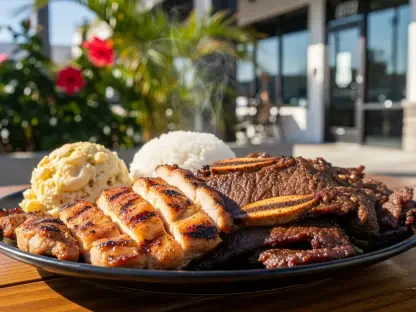The Wilmington area has seen a significant wave of restaurant and bar closures throughout 2024, even amidst the arrival of over 100 new eateries. More than 30 food and drink establishments have shut their doors, highlighting the inherent challenges within the restaurant industry, which is marked by frequent changes and economic pressures. These closures underscore the complexities and relentless nature of the food service sector, which continually faces shifts in market dynamics and consumer preferences.
Diverse Restaurant Types Affected
The range of restaurant closures in Wilmington spans various types, indicating that no segment of the market is immune to the difficulties faced by the industry. From chain restaurants and family-owned eateries to pizzerias, cafes, and specialized food concepts like non-alcoholic bars and food trucks, the diversity of affected establishments is vast. For instance, the Atlanta Bread Company, a Georgia-based chain bakery, ended its 20-year tenure in the Mayfaire shopping center in April. This closure illustrates how longstanding businesses are not exempt from the harsh realities of the current market.
Local favorites and national chains have both felt the impact. Bar Masonboro, a bar and restaurant that opened in 2020, shut down earlier this year but has since been replaced by a new pub. Similarly, Blaze Pizza, a popular pizza chain, closed its Military Cutoff Road location in early October. These examples showcase how the current economic pressures are influencing a broad spectrum of dining establishments, regardless of their origin or concept.
Economic Pressures and Market Shifts
Economic pressures such as rising costs, labor shortages, and shifts in consumer dining habits post-pandemic can be attributed to many of these closures. The restaurant industry has always been challenging, but the current economic climate has exacerbated these difficulties to a significant degree. For example, Blue Surf Arboretum West announced its closure set for Dec. 29, while the original location remains open. This scenario highlights the tough decisions business owners must make in response to financial strain and market conditions.
Unexpected closures have also been a recurring theme, often occurring without prior public announcements. The Boat Landing, a seasonal Sunset Beach restaurant, shut down unexpectedly, with new plans underway by its chef in the Southport area. These sudden and surprising closures reflect the unpredictable nature of the industry and the rapid changes that can unfold, forcing businesses to react swiftly and decisively in uncertain times.
Shifts to Other Ventures
Some business owners in Wilmington have pivoted to new ventures or shifted their focus to different aspects of their operations. For instance, Mamma Lucia, an Italian restaurant on Eastwood Road, closed to allow the chef to concentrate on catering and jarred sauce sales. This transition showcases how some restaurateurs are adapting to the ever-changing market by exploring alternative business models and revenue streams. These tactical maneuvers highlight the need for versatility and resilience in today’s volatile economic environment.
Similarly, The Greeks closed its Oleander Drive location but remains open on Market St. and plans to open another site in Leland. This strategic move emphasizes that while some locations may not be sustainable, there are still viable opportunities for growth and expansion in other areas. These decisions reveal a nuanced understanding of market dynamics and the importance of strategic planning for long-term success.
Impact on Local and National Chains
The string of closures has impacted both local and national chains, reflecting the widespread challenges within the industry. Jimmy John’s downtown Wilmington location shuttered mid-July, although other area locations continue to operate. This example highlights how even well-established national chains are not immune to the difficulties faced by the restaurant industry, reinforcing the idea that success and stability are often fleeting in this competitive market.
In another instance, Waffle House, a popular chain, unexpectedly closed its downtown location in August due to code violations posted by the city. This incident underscores the critical importance of compliance with local regulations and the potential consequences of failing to meet these standards. It also serves as a reminder that operational challenges can swiftly upend even the most enduring and beloved businesses.
Specialty Shops and Food Trucks
The wave of closures in Wilmington has not been limited to traditional restaurants and bars. Specialty shops and food trucks have also felt the impact of the current economic climate. Beyond the Bayou, a Louisiana-inspired food truck, ceased operations in June to pursue other opportunities. This decision reflects the unique challenges faced by mobile food vendors, who must navigate an already unpredictable market while also contending with the logistical complexities of operating on wheels.
Similarly, Mannkind Brewing, a Leland-based brewery, shut down at the end of November. Meanwhile, Mocksie, Wilmington’s only non-alcoholic bar and bottle shop, closed its storefront but continues through events and pop-ups. These examples illustrate the diverse range of businesses affected by ongoing economic pressures and the inventive ways they are seeking to adapt and survive in a challenging environment. These closures provide a glimpse into the broader struggles facing specialty food and beverage businesses today.
Conclusion and Observations
In 2024, Wilmington has experienced a notable wave of restaurant and bar closures, even as more than 100 new eating places have emerged in the area. Over 30 food and drink establishments have shut down, reflecting the intense challenges the restaurant industry faces. This industry is characterized by frequent changes and economic pressures, making it a tough business to sustain. The closures highlight the complex and demanding nature of the food service sector, which is constantly affected by shifting market dynamics and evolving consumer preferences. These changes create a challenging environment for maintaining steady operations. Entrepreneurs must navigate the volatile trends in dining habits and adapt quickly to stay afloat. Factors such as rising costs, labor shortages, and competitive pressures contribute to this tough landscape. Despite the influx of new eateries, the persistent closures serve as a stark reminder of the ongoing challenges faced by those in the restaurant and bar business. A sustainable presence in this sector requires strategic planning, adaptability, and resilience.









